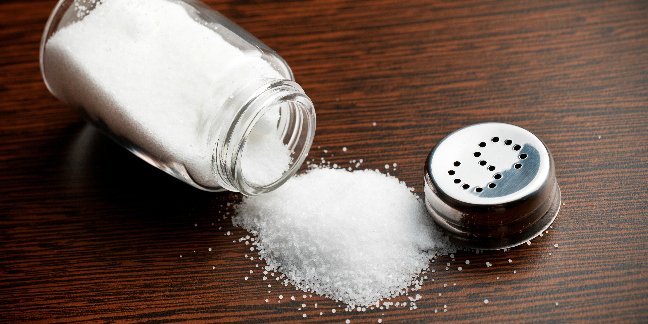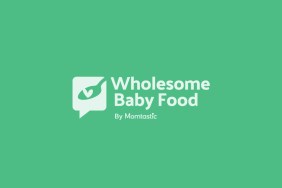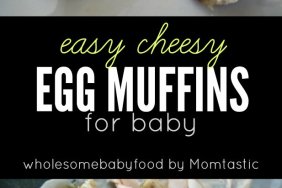Image: Shutterstock
Salt should never be used to flavor your baby’s food – whether it is homemade baby food or jarred food!
Many parents wonder about adding salt to their baby’s food. In fact, many parents want to add salt to baby’s food to give the food more flavor and to hopefully tempt baby into eating the baby food. It would seem that in such small amounts, adding a bit of salt to baby food would not be harmful.
The truth is, adding salt to baby food may be dangerous. Not only is adding salt to baby food possibly dangerous, it is just not necessary.
Many parents have chosen to make homemade baby food so that they will have control over the ingredients their babies are eating. It is the lack of fillers, salt and other additives that often sways parents into making baby food. Your baby has a clean palate and does not know that foods may taste better if salted.
Why start adding salt and forming a “dependancy” on it? You don’t want your baby to rely on salt to help her eat foods. Keeping high amounts of sodium out of baby’s diet is important. Added salt in baby food may lead to a series of health issues including high blood pressure and kidney failure.
![]() Try flavorful herbs and spices to perk up the flavor of foods and awaken your baby’s taste buds!
Try flavorful herbs and spices to perk up the flavor of foods and awaken your baby’s taste buds!
What does salt do to the kidneys? What Adding Salt May Do To Baby’s Health?
After your body has taken what it needs from the food, waste is sent to the blood. If your kidneys did not remove these wastes, the wastes would build up in the blood and damage your body. Your kidneys measure out chemicals like sodium, phosphorus, and potassium and release them back to the blood to return to the body. In this way, your kidneys regulate the body’s level of these substances. The right balance is necessary for life, but excess levels can be harmful.” National Kidney & Urologic Disease Information Clearing House
Your baby has a fragile system and the kidneys are one of the most fragile. Baby’s kidneys are unable to process a high amount of added salt. Too much salt from sources other than natural foods like veggies and fruits, breast milk and/or formula may damage baby’s kidneys and possibly even cause brain damage.
Adding Salt to a “Meal” or Baked Good Recipe that Baby Will Eat
As we mentioned, adding salt to baby’s food is not recommended. Besides the possible health risks, you want to keep your baby from establishing a dependency on salted foods. There are however instances where adding salt is acceptable. Many baked goods recipes, such as banana bread, call for salt as an ingredient. The amount of salt in a baked good recipe generally is between 1/4 teaspoon to 1 tablespoon, depending on the recipe and yield of the recipe. In this instance, as with sugar, your baby will probably ingest about 3 grains of sale in a 1 inch sized piece of banana bread; remember that the salt is spread throughout the recipe.
You are not adding 1 teaspoon of salt to the small piece of bread. The above is also true for a homemade “meal” recipe.
There are many soups, casseroles and other dishes that call for a “dash” of salt or 1/4 teaspoon to 1 teaspoon of salt. While we seldom add salt to any of these types of recipes (personal preference), offering your baby a bit of broccoli/cheese casserole that had 1/2 teaspoon of salt in the whole recipe should pose no harm. As with baked goods, remember that the salt is spread throughout the recipe. The most important thing is that you not add salt to baby’s foods as a seasoner. For example, do not add salt to baby’s squash puree to give it more flavor. Baby does not need a shake of salt with her veggies or meats. A shake of salt directly on baby’s potatoes is far different than a shake of salt in the family’s casserole dish.
“Hidden” Sources of Salt
Rutgers University notes the following: “Unfortunately, most of the sodium Americans eat today is added to food in the form of sodium chloride, or table salt. Food manufacturers also add table salt to food in the process of preserving and processing, as well as flavor enhancing. Sodium is also hidden as a part of other chemical additives, such as sodium nitrate, sodium benzoate saccharin, and monosodium glutamate. As a result, many Americans unknowingly consume three to five times more sodium than they need.”
Below you will find a list of sources of sodium compiled from ABC.go Health.
Prepared and Other Foods High in Salt/Sodium:
- Soups, vegetables, chilies and pastas in cans or soup-powder mixes
- Processed meats (such as packaged Deli meats), shellfish and other seafood
- Instant-cooked cereals
- Frozen dinners like pot pies
- Seasoning mixes (taco mixes, gravies and other sauces)
- Some pancake, muffin and other bread mixes
- Salted butter or margarine
- Salad dressing
- Soy Sauce
- Dutch-processed cocoa and instant cocoa mixes
- Instant noodles, rice and potatoes
- Health Foods
Even foods that sound healthy may be loaded with sodium. Check the labels on these “health foods” before you buy.
- Soy protein foods products like marinated tofu or miso.
- Processed cheeses including American, blue, Roquefort, Parmesan cheese, feta and cottage cheeses.
- Milk-based drinks including buttermilk
- Premade Asian foods made with teriyaki or soy sauce (unless you can control the sauce content)
- Cold cereals containing 200 milligram or more of sodium
Remember to always read and check the labels of the foods you buy.


